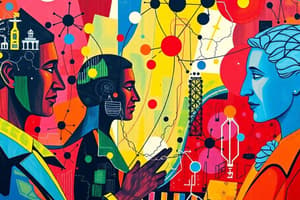Podcast
Questions and Answers
Which period is classified under the Pre-Historic Period?
Which period is classified under the Pre-Historic Period?
- Paleolithic Period (correct)
- Renaissance
- Age of Enlightenment
- Scientific Revolution
What type of tools did humans primarily use during the Paleolithic Period?
What type of tools did humans primarily use during the Paleolithic Period?
- Metal tools
- Basic stone and bone tools (correct)
- Plastic tools
- Wooden tools
Which of the following civilizations is part of the Ancient Period?
Which of the following civilizations is part of the Ancient Period?
- Medieval Civilization
- Paleolithic Civilization
- Contemporary Civilization
- Sumerian Civilization (correct)
What significant development occurred during the Iron Age?
What significant development occurred during the Iron Age?
What characterizes the Medieval or Middle Ages in terms of technological advancement?
What characterizes the Medieval or Middle Ages in terms of technological advancement?
What was a key transformation during the Scientific Revolution?
What was a key transformation during the Scientific Revolution?
In which period did the 3rd Industrial Revolution occur?
In which period did the 3rd Industrial Revolution occur?
Which development is associated with the Neolithic Period specifically?
Which development is associated with the Neolithic Period specifically?
What writing system was developed using symbols in Ancient civilizations?
What writing system was developed using symbols in Ancient civilizations?
Which of the following is NOT considered one of the Four Great Inventions of Ancient China?
Which of the following is NOT considered one of the Four Great Inventions of Ancient China?
Which civilization is credited with the invention of the odometer?
Which civilization is credited with the invention of the odometer?
The Roman Numeral System is a notable contribution from which civilization?
The Roman Numeral System is a notable contribution from which civilization?
Which philosopher is known for foundational contributions to mechanics and hydrostatics?
Which philosopher is known for foundational contributions to mechanics and hydrostatics?
Which scientist is credited with inventing the barometer?
Which scientist is credited with inventing the barometer?
Which structure is famous as a form of Roman entertainment?
Which structure is famous as a form of Roman entertainment?
What significant concept did Michael Faraday introduce in physics?
What significant concept did Michael Faraday introduce in physics?
During the time of Confucius, which astronomical phenomenon did Chinese astronomers calculate?
During the time of Confucius, which astronomical phenomenon did Chinese astronomers calculate?
Which of the following columns was NOT developed by the ancient Greeks?
Which of the following columns was NOT developed by the ancient Greeks?
What invention is Otto von Guericke known for?
What invention is Otto von Guericke known for?
Which scientist's work contributed to the development of integral calculus?
Which scientist's work contributed to the development of integral calculus?
What was a major impact of industrial machines during the Age of Invention?
What was a major impact of industrial machines during the Age of Invention?
Which of the following fields did Michael Faraday contribute to?
Which of the following fields did Michael Faraday contribute to?
What phenomenon did Otto von Guericke study with his air pump?
What phenomenon did Otto von Guericke study with his air pump?
Which notable invention is typically associated with the Early Modern Period?
Which notable invention is typically associated with the Early Modern Period?
What characterizes the Information Age?
What characterizes the Information Age?
Which development was associated with the Third Industrial Revolution?
Which development was associated with the Third Industrial Revolution?
What was a significant innovation during the Fourth Industrial Revolution?
What was a significant innovation during the Fourth Industrial Revolution?
Who is known as the father of the cellular phone?
Who is known as the father of the cellular phone?
What feature distinguishes the Fourth Industrial Revolution from earlier ones?
What feature distinguishes the Fourth Industrial Revolution from earlier ones?
Which of the following was a key development during the Third Industrial Revolution?
Which of the following was a key development during the Third Industrial Revolution?
Which technology was not part of the Fourth Industrial Revolution?
Which technology was not part of the Fourth Industrial Revolution?
What was a major outcome of the Third Industrial Revolution related to computing?
What was a major outcome of the Third Industrial Revolution related to computing?
Which invention is not considered one of the Four Great Inventions of Ancient China?
Which invention is not considered one of the Four Great Inventions of Ancient China?
Which civilization is credited with the invention of the water mill?
Which civilization is credited with the invention of the water mill?
What was a key development during the Second Industrial Revolution?
What was a key development during the Second Industrial Revolution?
During which period did science and technology experience significant advancements?
During which period did science and technology experience significant advancements?
Which period aimed to challenge old ideas and sought to improve societies?
Which period aimed to challenge old ideas and sought to improve societies?
Which of the following is not characteristic of the Age of Enlightenment?
Which of the following is not characteristic of the Age of Enlightenment?
Which technological advancement is associated with the transition from the Medieval period?
Which technological advancement is associated with the transition from the Medieval period?
Which of the following inventions is directly attributed to the Greeks?
Which of the following inventions is directly attributed to the Greeks?
Study Notes
Historical Development of Science & Technology
-
Prehistoric Period:
- Categorized into Stone Age, Bronze Age, and Iron Age.
- Represents human life before written records.
-
Stone Age:
- Paleolithic Period: Humans lived in caves, used basic tools, and controlled fire for cooking.
-
Ancient Period:
- Mesopotamian Civilization:
- Sumerians and Babylonians contributed to early writing and mathematics.
- Egyptian Civilization: Known for hieroglyphics and advances in construction.
- Ancient Chinese Civilization:
- Developed the Four Great Inventions: gunpowder, paper, woodblock printing, compass.
- Astronomy and mathematics were important fields of study.
- Greek Civilization:
- Innovations included water mills, odometers, and the foundation of geometry.
- Early medical practices and philosophy emerged.
- Roman Civilization:
- Contributions included the Roman numeral system, newspapers (Gazette), and codex books.
- Architectural advancements with basilicas and aqueducts.
- Mesopotamian Civilization:
-
Medieval / Middle Age:
- Characterized as the Dark Ages, with limited scientific advancement.
-
Modern Period:
- Early Modern Period:
- Renaissance sparked interest in science and arts.
- Scientific Revolution: Major advancements in scientific thought and methodology.
- Age of Enlightenment: Focus on reason, individualism, and scientific inquiry.
- Mid Modern Period (Age of Invention):
- Marked by the First and Second Industrial Revolutions; introduction of steam engines and semi-conductors.
- Contemporary Modern Period:
- Third Industrial Revolution started the digital age focused on electronics and computing.
- Fourth Industrial Revolution marks blending of digital, biological, and physical worlds (e.g., AI, robotics).
- Early Modern Period:
-
Notable Scientists during Technological Age:
- Martin Cooper, inventor of the first mobile phone, regarded as the father of cellular communication.
-
Philosophers and Scientists in Ancient Period:
- Archimedes: Founded mechanics and hydrostatics; calculated pi and developed many mechanical devices.
- Pythagoras: Made significant advancements in mathematics and astronomy; known for the Pythagorean theorem.
-
Notable Scientists in Early Modern Period:
- Evangelista Torricelli: Invented the barometer; contributions to integral calculus.
- Michael Faraday: Discovered electromagnetic induction; contributions to electrical engineering.
- Otto von Guericke: Invented the air pump; studied vacuums and air's role in combustion.
Key Concepts and Periods in Science and Technology
- Four Great Inventions of Ancient China: Gunpowder, paper, woodblock printing, compass.
- Greek Innovations: Water mills, odometers, alarming devices, and medical practices.
- Technological Age (21st Century): Rapid transition to information technology economy, digitalization, and convergence of multiple technologies.
Understanding Checks
- The Second Industrial Revolution is associated with textile production.
- Significant scientific leaps occurred in the Early Modern Period, leading to transformative changes in society.
- Inventions characterized by rapid industrial change during the Age of Invention, specifically machines that replaced human labor.
Conclusion
- Science and technology have continuously transformed societies since prehistoric times, leading to significant leaps during critical periods such as the Early Modern and Industrial Revolutions. The interplay between societal needs and technological advancements remains key to understanding their historical development.
Studying That Suits You
Use AI to generate personalized quizzes and flashcards to suit your learning preferences.
Related Documents
Description
Explore the pivotal interactions between science, technology, and society through different historical periods. This quiz covers the Pre-Historic to the Modern Periods, discussing how advancements have shaped and transformed societies over time.




